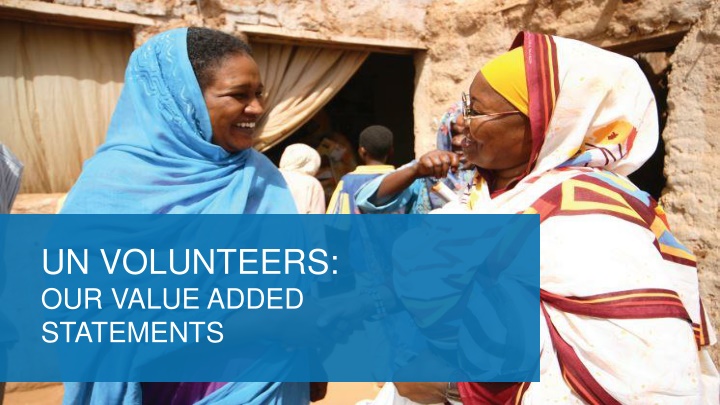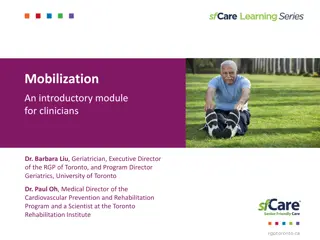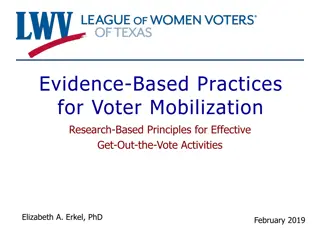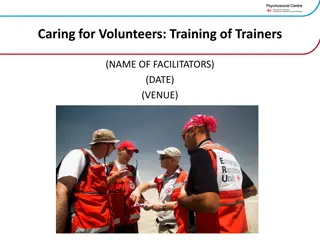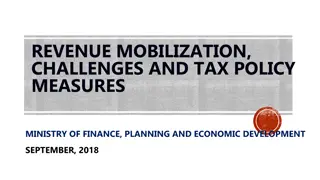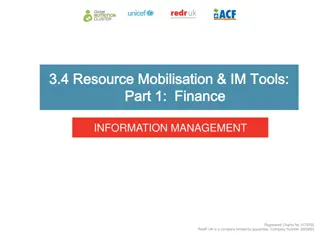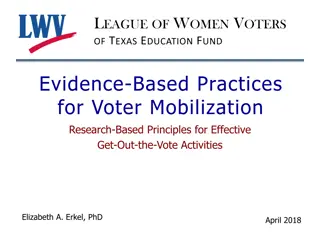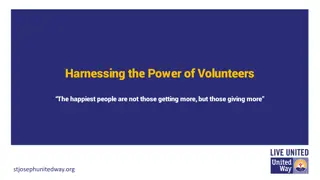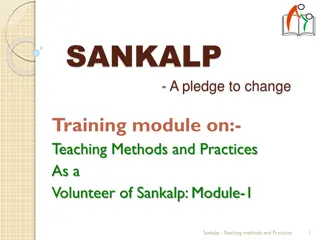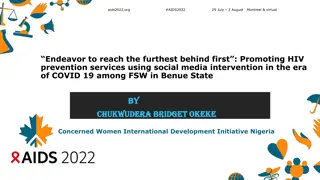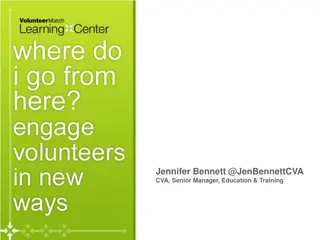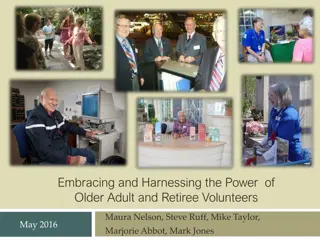UN Volunteers: Adding Value Through Mobilization and Engagement
UN Volunteers play a crucial role in peace and development by mobilizing qualified individuals worldwide, enabling broader participation in shaping the future, promoting volunteerism, and making significant contributions to sustainable development efforts. Their unique value lies in their ability to provide impactful and sustainable support, particularly in crisis situations and post-conflict areas.
Uploaded on Oct 04, 2024 | 2 Views
Download Presentation

Please find below an Image/Link to download the presentation.
The content on the website is provided AS IS for your information and personal use only. It may not be sold, licensed, or shared on other websites without obtaining consent from the author.If you encounter any issues during the download, it is possible that the publisher has removed the file from their server.
You are allowed to download the files provided on this website for personal or commercial use, subject to the condition that they are used lawfully. All files are the property of their respective owners.
The content on the website is provided AS IS for your information and personal use only. It may not be sold, licensed, or shared on other websites without obtaining consent from the author.
E N D
Presentation Transcript
UN VOLUNTEERS: OUR VALUE ADDED STATEMENTS
UNV MOBILIZES PEOPLE UNV mobilizes a much needed resource of qualified people, from the seasoned and committed to the optimistic and young, who are ready to make their energy and skills available for UN partners to draw upon in the pursuit of peace and development. During 2015, 6,796 UN Volunteers were deployed to 122 countries, 82 per cent from countries of the South. 435 were recruited as UN Youth Volunteers; over 60 per cent of these were young women. Another 11,554 UN Online Volunteers proved that you can be anywhere in the world and still be a force for global development.
UNV ENABLES PARTICIPATION UNV enables the UN system to broaden participation of people striving for a better future. During the UN global consultation leading up to creation of the Sustainable Development Goals (SDGs), UNV supported countries organizing national dialogues through deploying dedicated national and international UN Volunteers. UNV also supported volunteer-involving organizations in their substantive engagement with the post-2015 process, and the creation of spaces for volunteer groups to be recognized as stakeholders of the new 2030 agenda.
UNV PROMOTES VOLUNTEERISM UNV promotes volunteerism for peace and development through its strong partnerships and capacity to engage volunteers. UNV engages with partners to strengthen the national and regional systems needed to build capacity for volunteerism, through supportive infrastructure and ensuring an environment where volunteerism can flourish. Through these efforts, several hundreds of thousands of volunteers have engaged meaningfully with communities, whether at home or abroad, and brought about real development progress. In 2014, UN Member States increased their requests for UNV support for the establishment of national volunteer schemes.
UN VOLUNTEERS MAKE IMPORTANT CONTRIBUTIONS UN Volunteers make important contributions to UN action in the pursuit of sustainable development, with a particular focus on people in transition or crisis. UNV has been key in supporting UN Security Council peacekeeping and political mission mandates since the early 1990s. To date, more than 14,000 UN Volunteers have been deployed to support the work of UNDPKO and UNDPA in war-torn and post-conflict areas, serving in more than 40 different peacekeeping and political and peacebuilding operations. UNV s contributions have also taken the form of emergency relief support, early and long-term recovery expertise and human rights monitoring.
UN VOLUNTEERS ADD UNIQUE VALUE UN Volunteers constitute a resource in ensuring impact and sustainability in UN peace and development interventions. UN partners and programmes benefit from thousands of UN Volunteers expertise and inspiration assigned within five focal programmatic areas and covering a range of skills from water engineering to midwifery. With 25,000 vetted, well-qualified potential volunteers for the field and over 300,000 potential online volunteers, and a growing number of UN Youth Volunteers: UN Volunteers are an attractive, cost effective modality to UN entity partners. As 80 per cent of UN Volunteers come from the South, they tend to be familiar with local development challenges and societal norms. By applying culturally-sensitive approaches that foster participation, generate a sense of ownership and lead to sustainable change. UN Volunteers embody the fundamental values of commitment, inclusiveness, engagement and solidarity.
UN Volunteers constitute a resource in ensuring impact and sustainability in UN peace and development interventions. UNV s response to the 2014 Ebola crisis in West Africa is a standout example of UN Volunteer commitment to service. UN Volunteers stepped up to fight Ebola in Guinea, Liberia and Sierra Leone, supporting the UN Mission for Ebola Emergency Response (UNMEER) through patient tracing, awareness and sensitization, and the coordination of food distribution. Partnering with World Food Programme (WFP), UN Volunteers were integral in reaching over 600,000 Ebola-affected people in Sierra Leone. UN Volunteers embody the fundamental values of commitment, inclusiveness, engagement and solidarity.
UN VOLUNTEERS BRING COMMUNITIES TOGETHER UN Volunteers work with people and organizations in local communities to link UN initiatives with local needs for sustainable solutions. UNV has supported the response to the tuberculosis (TB) epidemic in Uzbekistan since 2009. In northwestern Uzbekistan, UN Volunteers played a vital role in preventing and controlling the spread of TB. In spring 2014, one international, four national and 10 part-time national UN Volunteers trained 1,730 community volunteers in TB prevention, reaching 128,000 people in 32,000 households.
VOLUNTEERS ARE CATALYSTS OF CHANGE Volunteers make a difference to the communities where they are assigned by being helping hands as well as being active models of change. In Churachandpur, a remote tribal district of Manipur, India, four national UN Youth Volunteers are collaborating with the local community to run a school for children with special needs. The volunteers are training teachers and parents, and educating local organizations and the public about the role of the community in supporting children with special needs. Inspired by their work, community members have volunteered their services and time and as a result 25 children with disabilities now have access to education and professional support. Volunteers transform societies and are themselves transformed through volunteering.
Volunteers make a difference to the communities where they are assigned by being helping hands as well as being active models of change. My name is Manash Gadtaula and I am a national UN Volunteer in Nepal. I serve as a civil engineer in a team of eight for the United Nations Development Programme (UNDP) building demolitions project, as a support for the Village Development Committee. Demolition of houses can sound counter-intuitive but it is actually necessary in order to prevent further loss of lives during the aftershocks. I am happy to contribute to the well-being of my people in that way, even though it implies being apart from my family. Despite the hardships, this is a very enriching experience and I would like to thank UNDP for providing me an opportunity to join this mission. Volunteers transform societies and are themselves transformed through volunteering.
VOLUNTEERISM ENABLES PEOPLE TO PARTICIPATE Volunteerism is an opportunity for everybody, including marginalized groups, women and youth, to have their voice heard and their actions recognized. Karina Garcia, an 18-year-old from Guatemala, belongs to a rural indigenous community where most of the population faces social, economic and political problems. In 2012, she and 20 other youth volunteers launched a project to encourage intergenerational dialogue on social issues, educating thousands of young people and their parents about domestic violence and sex education. At the age of 15, she attended the Permanent Forum on Indigenous Issues at the United Nations in New York to highlight problems particular to youth of indigenous communities in Guatemala. Karina s experience as a volunteer gave her the strength to continue fighting for a better world, and helped her leap over the barriers of marginalization, poverty and discrimination. Volunteerism strengthens social cohesion and trust by promoting individual and collective action, leading to sustainable development for people by people.
Volunteerism is an opportunity for everybody, including marginalized groups, women and youth, to have their voice heard and their actions recognized. The State of the World s Volunteerism Report, Transforming Governance, finds that countries that provide a supportive enabling environment for volunteers tend to reap the rewards of their inclusion in decision-making. It praises some governments such as Peru, Mozambique and Norway who have passed laws and set up frameworks to formalise the contribution of volunteers. But it says too many other governments are failing to acknowledge and leverage the immense potential of volunteers to help them chart a more successful development path. It calls on all governments to go beyond the rhetoric of participation and take concrete steps to help the world s volunteers actively contribute to the decisions that affect people s lives. Volunteerism strengthens social cohesion and trust by promoting individual and collective action, leading to sustainable development for people by people.
